The weather was less than ideal, but the Public Math booth was there for the Doors Open Milwaukee Block party. Visitors had the chance to play with math actives and test their Venn diagramming skills with a street survey.
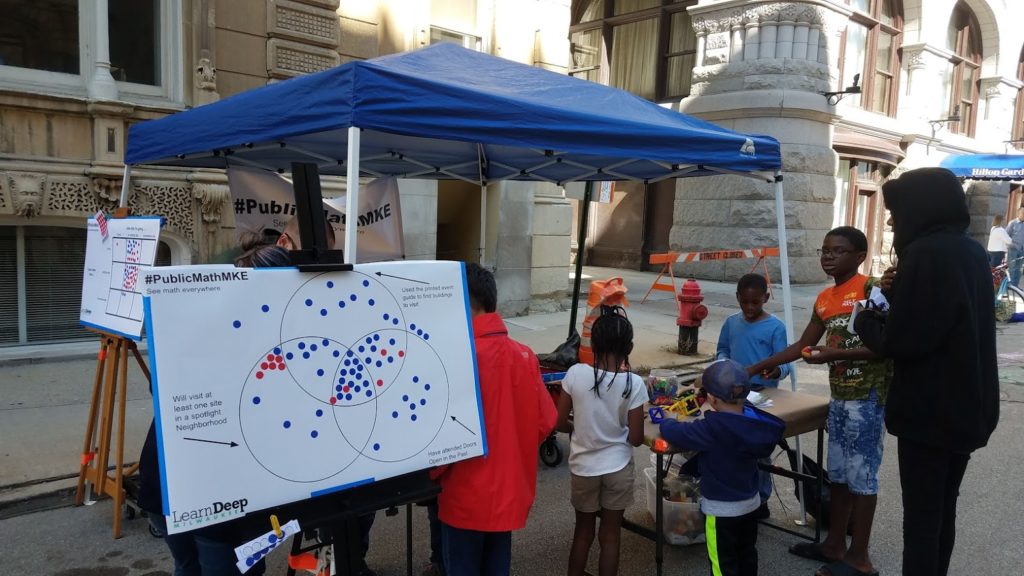
The weather was less than ideal, but the Public Math booth was there for the Doors Open Milwaukee Block party. Visitors had the chance to play with math actives and test their Venn diagramming skills with a street survey.

Shevaun Watson, Director of the composition program in UWM’s English Department, and I met for coffee in April to talk about her work on the landscape of languages. Followers of Learn Deep know of our interest in maps as a point of engagement for students, and I was curious to learn more. There’s an interesting project in that work, particularly for schools with students who speak a diverse range of languages.
Towards what I had expected to be the end of our conversation, Shevaun asked what else we were working on. I mentioned an idea that had originated in conversations at Reagan High School. While the school had healthcare career tracks, students had little sense of the broad range of careers inside of healthcare or the varied paths people might take to get there. We thought an interesting way to address that would be to have students interview folks in a wide range of health care careers. The focus would not be on the classes they took or what their day to day work looks like, but the experiences they had which led them to their career and helped develop the skills they now use. We saw this as a process that could be used across domains, and, if the stories could be gathered and told by students across the community, a great resource for career exploration.
Shevaun was intrigued — she and her colleagues have been looking at ways to leverage the humanities for community engagement. They were also getting a little tired of reading “interest papers” on abortion, gun control, and legalizing marijuana. She asked “What if we gave you a couple of sections of a freshman English class to pilot the process?” Over the summer we met with Shevaun’s team and teachers from Reagan, New Berlin, and Dr. Howard Fuller Collegiate Academy to map out what that might look like, and what the high schools teachers would need to pull the work into their classes.
Our pilot is now underway. We tapped our network to assemble a pool of interview candidates that includes everyone from a community healthcare advocate to bio-medical engineers to sports medicine professionals to an attorney representing the rights of the disabled. Students will conduct their interviews the week of October 7th. We look forward to where this will lead.
Students from seven area high schools met a UWM yesterday for a session on occupational ergonomics lead by Madiha Saeed Ahmed from UWM’s College of Engineering. The students are part of this year’s Zoo Train Engineering Challenge, will is focused on improving the coal handling process for the Zoo’s steam locomotives.
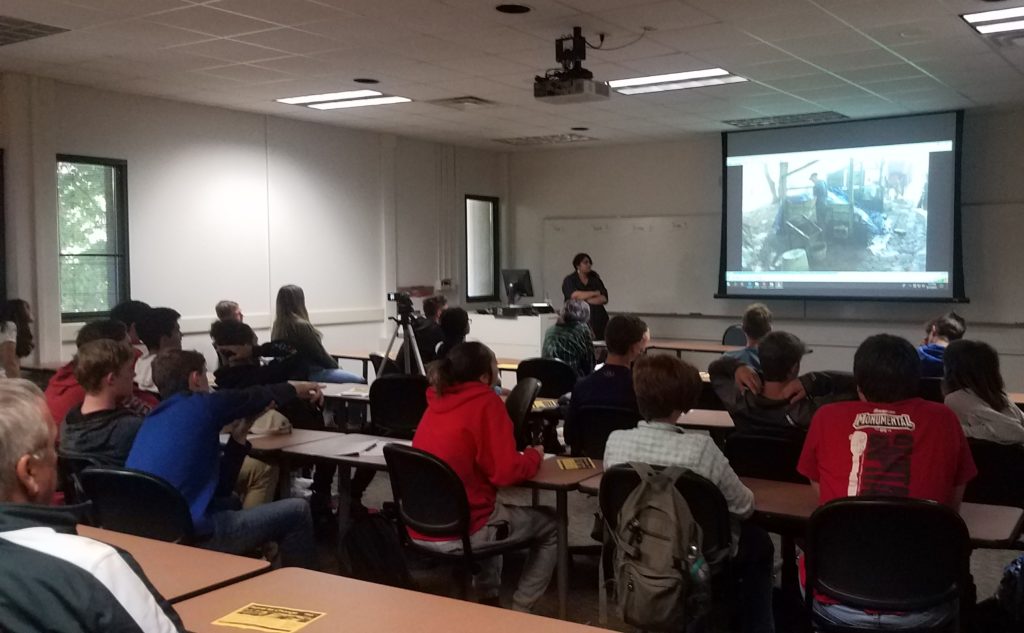
The current process is to manually sift coal into buckets which can weigh 90 pounds when full. These are carried down an uneven walkway along the tracks where they are staged until needed. When the train staff need to re-load coal for the train, the buckets are dumped into the train’s tender, through an opening that is close to four feet off the ground. Needless to say, plenty of issues to look at.
Our math booth was out at Maker Faire this weekend testing out activities with kids and families. Mary Langmyer brought her enthusiasm and wagon full of materials to engage students in math explorations.
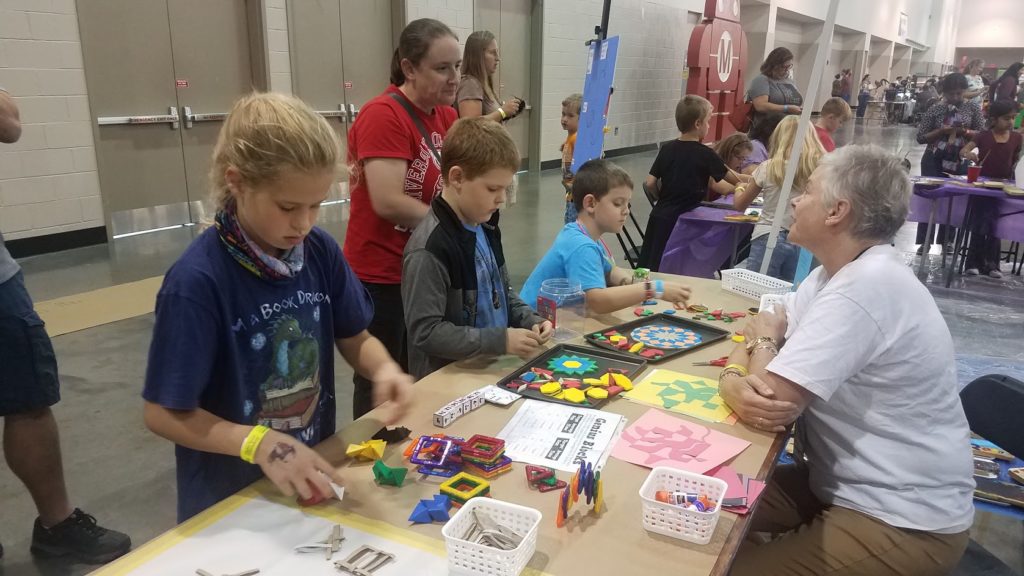
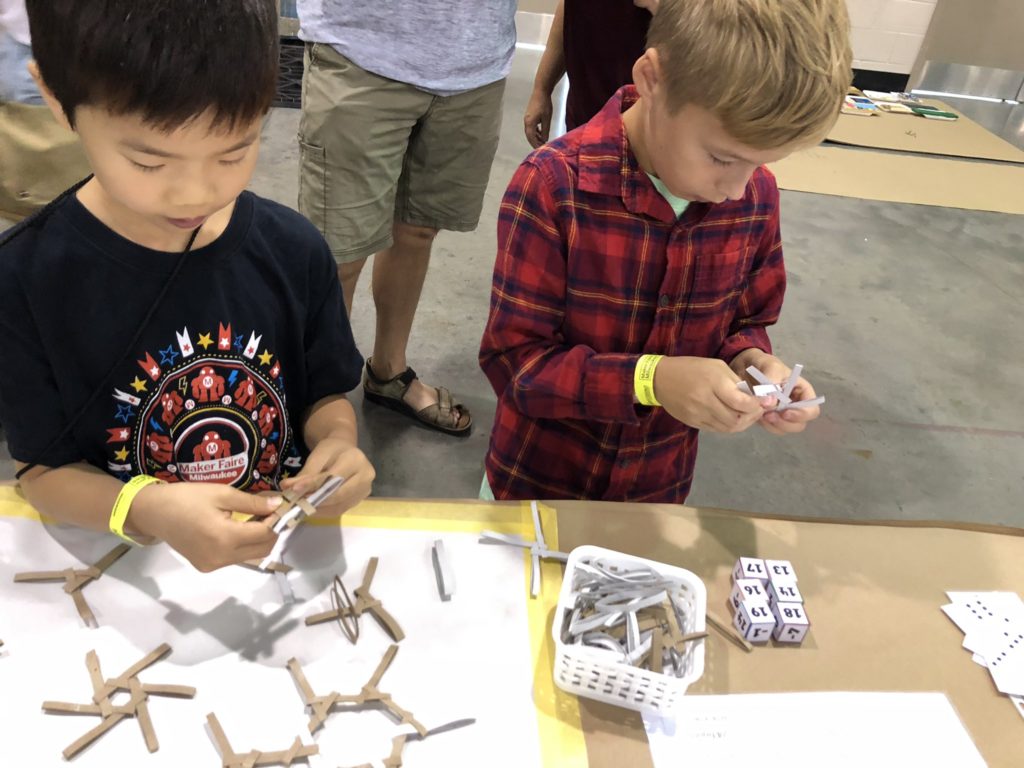
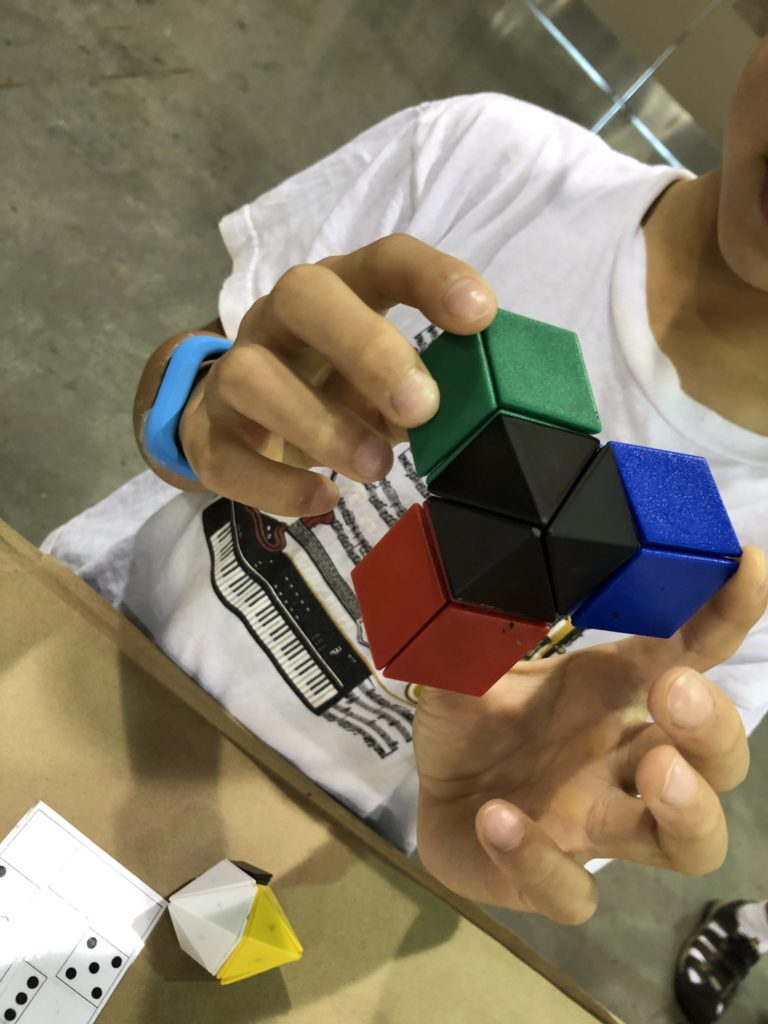
MATC started their fieldwork to create a survey and site plan of the coal handling area at the Milwaukee County Zoo. The survey work will give students participating in our Zoo Train Challenge an accurate site plan for the area as they look to redesign the coal handling process. The survey effort is led by instructor David Langhoff, who was looking for an opportunity to get his students engaged in a real world project. MATC students working to help middle and high school students help the Zoo. #Collaboration
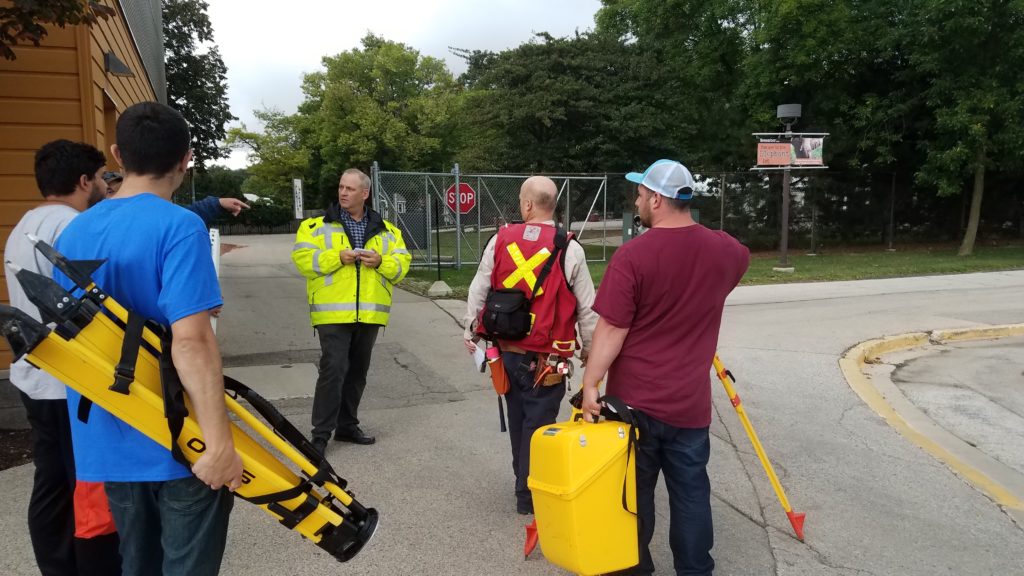
Our Collab Lab series is back for a 4th season! Join us on October 10th to kick off the series with Collab Lab 29: Building Skilled Trades Talent. The complete schedule for the season is below.
This past spring, through a grant from Northwestern Mutual, we completed a project that identified factors that drive the willingness of teachers and mentors to participate in initiatives aimed at developing computational thinking skills. Here’s a summary of that effort and what we found.
Solid computational thinking skills[1] are useful across domains and provide a key foundation for the development of tech talent. Developing these skills within computer science classes is constrained by several factors:
Widespread development of computational thinking (CT) skills will require a different approach— one that can leverage the interests and passions of both students and teachers in domains outside of computer science.
Through a grant from Northwestern Mutual, we interviewed a total of 11 teachers involved with either MPS’s efforts to introduce Project GUTS, SHARP Literacy’s Design Through Code (DTC) program, or TEALS. Recognizing that computational thinking is a perspective new to most teachers and they would benefit from outside support, we also conducted interviews with 10 mentors from the FIRST Robotics and TEALS programs. Each of these programs provides an opportunity for students to develop computational thinking skills. Apart from TEALS, all are in domains and classes outside of computer science.
We use the lens of Jobs to Be Done to understand how teachers and industry mentors make decisions about where and how to invest their time and energy. Adoption of a useful and effective practice will move no faster than the practice solves a real problem for teachers in the context within which teachers operate. Failure to understand the context within which a teacher might employ a practice and how this practice fits given their other priorities will, at best, slow adoption. At worst, it will lead to active resistance. For mentors, if the chance to guide students in work that can build computational thinking skills does not align with their own goals, pressures, and schedule, they won’t do it.
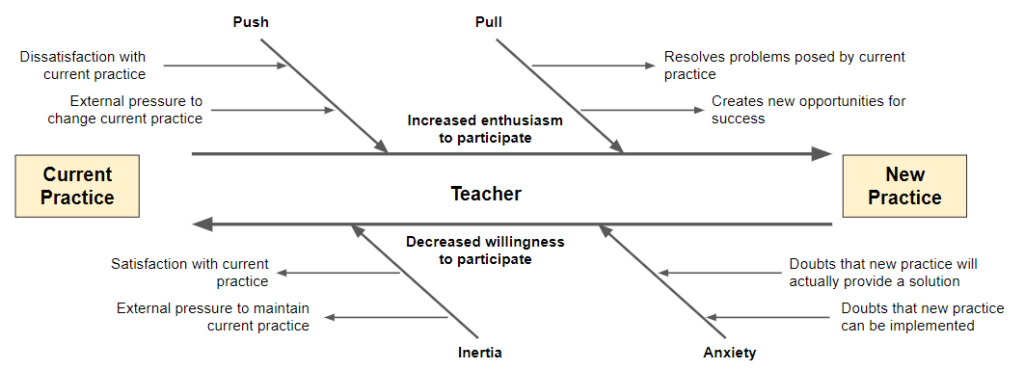
“I felt it was my responsibility as an educator to at least learn and bring coding to them”
For teachers, the primary factors which led them to participate in one of the three programs noted above are:
Factors holding them back from doing more with the programs are a lack of experience with coding, modeling dynamic systems (Project GUTs), or design thinking (DTC).
“I want to help kids do cool, hard things.”
The mentors we interviewed are motivated by a desire to help students build skills–not just in coding, but an ability to work with a team– and to see them succeed in a challenging project. Their willingness to participate is tempered by the obligations they feel towards their colleagues at work– they want to know that the time they spend as volunteers at worst does not impact their team, and at best, makes them a better team member.
Given what we heard over the course of these interviews, we see a number of opportunities for interventions which could support teachers who want to expose their students to computational thinking in general and speed the adoption of Project GUTS in particular.
“…the interactions of students, the sharing of ideas, are almost more adult.”
Project GUTS provides an opportunity to expose students to coding in ways that allow them to explore ideas and problems in science. The tools provide a way for students to test ideas and lets their curiosity around the topic or problem at hand drive their desire to master the coding required to do so. This approach offers both teachers and students many more possible points of engagement than would a program focused on simply learning how to code.
We were surprised by the enthusiasm teachers showed for Project GUTS. Teachers involved with the program recognize its value, can see opportunities where it can be used effectively, and are excited enough by the possibilities that they look to get colleagues involved.
The teachers we spoke with all had specific ideas for the topics they’d like to explore with Project GUTS. Several mentioned a desire to collaborate with colleagues at their own school or to connect with colleagues at other schools working on the same topics. Beyond having additional training or ad hoc support from district specialists, the current set of Project GUTS teachers could benefit from:
Teachers were not completely confident in their ability to make full use of the tools without additional support. An outside mentor who can bring domain expertise around the systems to be modeled and some sense of how best to do so would provide welcome help.
The time commitment here need not be anywhere near as intensive as that required by TEALS. Having some availability to exchange ideas with a teacher and visit a class a few times per semester when students are working through models would be a valued addition to the support currently provided by colleagues and curriculum specialists within MPS.
Teachers value on-going relationships with mentors and want the same for their students. Having a mentor assigned to a teacher for the duration of a school year is preferable to a pool of volunteers where any one of whom might drop in on an ad-hoc basis. This partnership would be further enhanced if teachers have a chance to work with mentors who interests are strongly aligned with their own.
Mentors want to know that the time they spend with students is valued by their employer and that it does not distract from the work their team needs to complete. While mentors recognized that work with K-12 students can provide an opportunity to develop skills they can leverage in the workplace, few of those we spoke with indicated this was recognized by their employer.
Overt signals from the employer that mentorship work is valued as a professional development opportunity by the firm will leave mentors more willing to participate. As examples, a firm might:
The desire of teachers for support they can count on, and that of mentors to see growth are more easily satisfied when mentors have an ongoing role with the class or classes they support. Mentors who have built good relationships with the students they work with are an asset to the teacher and allow the teacher to play a higher value role within the classroom.
Want to know explore our findings in greater detail? Our full report detailed report is available here. If you’re interested in leveraging what we’ve found, or helping Milwaukee move forward with any of our recommendations, let us know.
[1]Computational thinking practices: